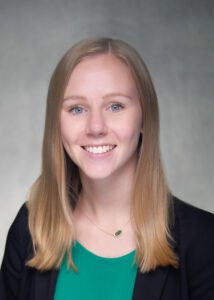The Young Investigator Award (YIA) provides two-year salary support to early career NF researchers to help them get established as independent NF investigators. Since its inception, several YIAs have made groundbreaking research findings and notable publications through this program, and many have advanced to become leaders in the NF research and clinical communities.
We’re pleased to introduce some of these researchers from the latest class of awardees: Alexa Sheehan (Ph.D. Candidate, Dodd Lab, University of Iowa Carver College of Medcine) tells us how her mother’s experience as a pediatric oncology nurse inspired her passion to help people.
 What are you hoping to learn from this project?
What are you hoping to learn from this project?
We are hoping to better understand how MPNSTs metastasize and to identify and screen various therapeutics that inhibit metastasis in order to improve outcomes for patients.
What are your long-term research goals?
I hope to continue investigating mechanisms of cancer initiation and progression with the ultimate goal of working with other scientists to develop better treatment options for patients.
Tell us about life in a research lab. What’s a typical day look like?
When I get into the lab, I start by checking my email and reviewing my to-do list for the day. Then I check on the cells I have growing in the incubator and transfer them to new plates so they can continue growing and I can use them in various experiments. Next I’ll check on my in vivo tumor growth studies and start my main experiment for the day. This usually involves thawing samples from the freezer or counting cells, adding various buffers and substrates, and then letting the experiment incubate for a few hours. During this time, I’ll analyze previous data I generated during the week or plan future experiments. I typically have a seminar or meeting to attend most days where we discuss our research progress, new papers in the field, and how to troubleshoot our experiments. After a few hours, I return to my samples and change solutions, stain cells, etc. to finish up the assay. I usually end the day by updating my lab notebook, planning my experiments for the following day, and reading papers relevant to my field of study.
What brought you to the NF research field?
My mother was a pediatric oncology nurse and her stories inspired my passion to understand how these diseases develop and to use that information to help patients. Upon joining Dr. Dodd’s lab at the University of Iowa, I was introduced to the NF field and was immediately struck by the strong sense of community experienced by all people involved including researchers, physicians, patients, and families. As I learned more about this group of disorders and the effects they have on daily life for patients, I became committed to doing my part to improve outcomes. The NF community is tight-knit, supportive, and inspiring on all sides and I am thrilled to be a small part of it.
What do you like to do when you’re not in the lab?
Outside of the lab, I enjoy reading, watching sports, exercising, and having game nights with my friends.
What does it mean to you to receive this funding from CTF?
Receiving this funding from CTF is an honor. I am so lucky to have the opportunity to study something I am passionate about and to have the support of such an amazing organization that directly impacts patients. The way NF patients courageously approach life in the face of uncertainty is inspiring and I am honored to have been given the chance to do this work and hopefully improve patient’s lives. Additionally, as a young investigator early in my research career, the support I have been given from CTF is an opportunity to establish myself in the field and learn valuable skills that I can use for the rest of my career. I am very grateful that CTF believes in this project, and I am excited to continue working on improving outcomes for patients with NF.
Learn more about our latest investments in young investigors; click here for NF1 projects and click here for SWN projects (including NF2-related schwannomatosis). Click here to learn more about funding opportunities, including the Young Investigator Awards, from the Children’s Tumor Foundation.

